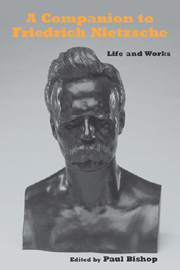Book contents
- Frontmatter
- Contents
- Acknowledgments
- A Note on Editions and Abbreviations
- Introduction
- Link to Nietzsche's Early Writings
- Link to The Birth of Tragedy
- Link to Untimely Meditations
- Link to Human, All Too Human
- Link to Daybreak
- Link to The Gay Science
- Link to Zarathustra
- Link to Beyond Good and Evil
- Link to On the Genealogy of Morals
- Link to The Case of Wagner and Nietzsche contra Wagner
- Link to Twilight of the Idols, The Anti-Christ, and Ecce Homo
- Link to the Nachlass
- Conclusion
- Notes on the Contributors
- Index
Link to Untimely Meditations
Published online by Cambridge University Press: 05 February 2013
- Frontmatter
- Contents
- Acknowledgments
- A Note on Editions and Abbreviations
- Introduction
- Link to Nietzsche's Early Writings
- Link to The Birth of Tragedy
- Link to Untimely Meditations
- Link to Human, All Too Human
- Link to Daybreak
- Link to The Gay Science
- Link to Zarathustra
- Link to Beyond Good and Evil
- Link to On the Genealogy of Morals
- Link to The Case of Wagner and Nietzsche contra Wagner
- Link to Twilight of the Idols, The Anti-Christ, and Ecce Homo
- Link to the Nachlass
- Conclusion
- Notes on the Contributors
- Index
Summary
The Birth of Tragedy was written in (and, in a sense, against) a number of contexts: the military context of the Franco-Prussian War; the political context of the proclamation of the German Reich in Versailles on 18 January 1871, of the declaration of the Paris Commune on 18 March of the same year, and of the growing revolutionary movement in Europe; and the academic-political context of Basel, especially the philological circles in which Nietzsche had to operate. As early as on 20 November 1868, after his first meeting with Wagner in the Brockhaus household, Nietzsche wrote a letter to Rohde in which his dissatisfaction with scholars and with his academic colleagues was expressed with some force. Here he speaks of “the teeming broods of philologists of today, […] the entire molelike activity, with their full cheek-pouches and their blind eyes” (das wimmelnde Philologengezücht unserer Tage […], das ganze Maulwurfstreiben, die vollen Backentaschen und die blinden Augen), and what upset him was not just “their joy at the captured worm and their indifference to the real, indeed the insistent problems of life” (die Freude ob des erbeuteten Wurms und die Gleichgültigkeit gegen die wahren, ja aufdringlichen Probleme des Lebens; KSB 2, 344). This letter strikes one of the first notes in what will become a constant theme in Nietzsche's writings: the relationship between scholarly, academic activities and the tasks of the “real world”; ultimately, the relation of knowledge to life.
- Type
- Chapter
- Information
- A Companion to Friedrich NietzscheLife and Works, pp. 81 - 85Publisher: Boydell & BrewerPrint publication year: 2012



